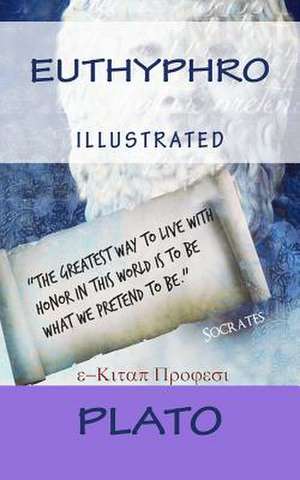Euthyphro
Autor Plato Ilustrat de Murat Ukray Traducere de Benjamin Jowetten Limba Engleză Paperback
| Toate formatele și edițiile | Preț | Express |
|---|---|---|
| Paperback (12) | 34.93 lei 3-5 săpt. | |
| CreateSpace Independent Publishing Platform – | 34.93 lei 3-5 săpt. | |
| CREATESPACE – | 37.57 lei 3-5 săpt. | |
| CREATESPACE – | 44.13 lei 3-5 săpt. | |
| CreateSpace Independent Publishing Platform – | 44.13 lei 3-5 săpt. | |
| CREATESPACE – | 50.46 lei 3-5 săpt. | |
| CREATESPACE – | 80.27 lei 3-5 săpt. | |
| CreateSpace Independent Publishing Platform – | 45.90 lei 6-8 săpt. | |
| – | 51.12 lei 6-8 săpt. | |
| – | 56.82 lei 6-8 săpt. | |
| Binker North – 15 iul 2023 | 73.50 lei 6-8 săpt. | |
| Book Jungle – 3 iul 2008 | 80.69 lei 6-8 săpt. | |
| CreateSpace Independent Publishing Platform – | 105.14 lei 6-8 săpt. | |
| Hardback (1) | 215.60 lei 6-8 săpt. | |
| Blurb – 22 mar 2023 | 215.60 lei 6-8 săpt. |
Preț: 63.56 lei
Nou
Puncte Express: 95
Preț estimativ în valută:
12.16€ • 12.73$ • 10.06£
12.16€ • 12.73$ • 10.06£
Carte indisponibilă temporar
Doresc să fiu notificat când acest titlu va fi disponibil:
Se trimite...
Preluare comenzi: 021 569.72.76
Specificații
ISBN-13: 9781500731700
ISBN-10: 1500731706
Pagini: 80
Dimensiuni: 127 x 203 x 5 mm
Greutate: 0.1 kg
Editura: CREATESPACE
ISBN-10: 1500731706
Pagini: 80
Dimensiuni: 127 x 203 x 5 mm
Greutate: 0.1 kg
Editura: CREATESPACE
Notă biografică
Plato was an ancient Greek philosopher born in Athens during the Classical period in Ancient Greece. In Athens, Plato founded the Academy, a philosophical school where he taught the philosophical doctrines that would later become known as Platonism. Plato (or Platon) was a pen name derived, apparently, from the nickname given to him by his wrestling coach - allegedly a reference to his physical broadness. According to Alexander of Miletus quoted by Diogenes of Sinope his actual name was Aristocles, son of Ariston, of the deme Collytus (Collytus being a district of Athens).Plato was an innovator of the written dialogue and dialectic forms in philosophy. He raised problems for what later became all the major areas of both theoretical philosophy and practical philosophy. His most famous contribution is the Theory of forms, which has been interpreted as advancing a solution to what is now known as the problem of universals. He is also the namesake of Platonic love and the Platonic solids.
